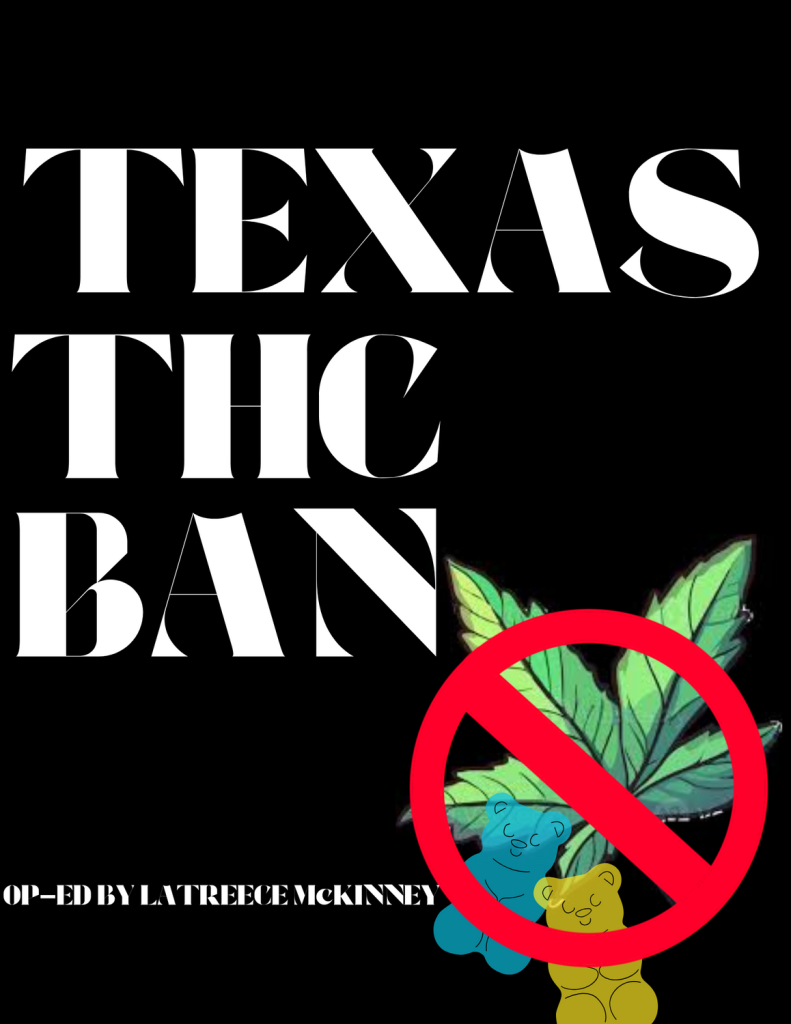
Karla Carrillo
On March 19, the Texas Senate passed a state ban on all forms of tetrahydrocannabinol, also known as THC. Coming from his December 2024 proposed bill to “ban all forms of THC and keep these unsafe products off our streets,” Lt. Gov. Dan Patrick is closer to further solidifying Texas’ aggressive stance on cannabis criminalization.
But while lawmakers push to outlaw THC in the name of public safety, they remain far more lenient on other substances and policies—like easy access to alcohol and firearms—that statistically pose more significant threats. The question must be asked: Is this truly about public health, or is it about control?
George Orwell’s “1984” tells a story of a dystopian world that explores the overreaching hand of the government through totalitarian rule. It is with “well-meaning guidance” that The Party, the oppressive, always-watching government, dictates the reality of its people through extreme surveillance, manipulation and propaganda. If the tale of “1984” sounds eerily familiar to you, it is not because you read the book but because the Texas government is, again, restricting its peoples’ personal freedoms.
It is to be noted that there is a basis for the government’s concern with THC and its exposure to children. Released by the American Academy of Pediatrics, a six-year study from 2017 to 2021 found that, “In 2017, there were 207 reported cases [of pediatric cannabis edible ingestions], and in 2021 there were 3,054 cases, an increase of 1,375%.”
On the market, THC can be consumed in various forms like candy, baked goods, and beverages, which can be appealing to young children. Supporters of the recent THC ban, such as Patrick and Sen. Charles Perry, have claimed the ban to be in the best interest of protecting children as a response to a so-called public crisis.
However, it begs one to wonder why some Texas lawmakers have chosen to target THC so aggressively while turning a blind eye to other substances that pose significant risks to public health.
If the true goal is to protect children, why has the state not taken similar action against alcohol, which contributes to thousands of underage hospitalizations and deaths each year, or firearms, which remains the leading cause of death for children in the US?
The Johns Hopkins Center for Gun Violence Solutions released a report from a 2022 study highlighting the stark statistics of gun deaths among children and teenagers. Their report stated, “There were 2,526 gun deaths in 2022 among 1- to 17-year-olds, averaging to nearly 7 per day.”
Moreover, why does this ban extend beyond high-potency cannabis products to include even non-intoxicating forms of THC, such as those found in legal hemp-derived products? The sweeping nature of this legislation suggests that the motivation goes beyond child safety—perhaps toward corporate influence, political posturing, or simply exerting greater control over personal freedoms.
If Texas legislators were truly concerned about public health, why would a balanced approach—such as tighter regulation, childproof packaging, and public education—not be more effective than an outright ban? Instead, this decision reflects a familiar pattern: selective moral panic that benefits those in power while stripping Texans of their personal choices.